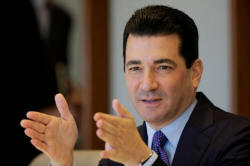|
 FDA
plans more restrictive policy for bulk drug compounding FDA
plans more restrictive policy for bulk drug compounding
 Send a link to a friend
Send a link to a friend
[January 19, 2018]
By Nate Raymond
(Reuters) - The head of the U.S. Food and
Drug Administration on Thursday said it is preparing a new, more
restrictive policy targeting what drugs compounding pharmacies can
produce that do not go through the agency's approval process.
|
|
 FDA Commissioner Scott Gottlieb said the agency in March will issue
draft guidance with new criteria for determining what substances can
be used to produce drugs in bulk for hospitals and doctors' offices
without individual patient prescriptions. FDA Commissioner Scott Gottlieb said the agency in March will issue
draft guidance with new criteria for determining what substances can
be used to produce drugs in bulk for hospitals and doctors' offices
without individual patient prescriptions.
"Ultimately, there's no question that the framework we will be
laying out will place more restrictions on what they can do,"
Gottlieb told Reuters.
The announcement was one of several by the FDA on Thursday regarding
its priorities in 2018 for drug compounding, which involves
pharmacists making drugs to meet patients' specific needs.

Gottlieb said the FDA is also preparing a new policy to give state
boards of pharmacy more flexibility to oversee compounding
pharmacies that ship drugs interstate and is still working on
guidance to encourage more pharmacies to register with the FDA.
According to the American Pharmacists Association, 7,500 pharmacies
specialize in compounding medicines, which traditionally involved
mixing tailored doses for individual patients in response to a
specific prescription.
By 2012, the practice had mushroomed, with some pharmacies selling
thousands of doses of regularly used mixtures without prescriptions
for physicians to keep for future use.
A fungal meningitis outbreak that year caused by contaminated
steroids produced by a Massachusetts compounding pharmacy, New
England Compounding Center, sickened hundreds of patients and killed
76, prosecutors said.
After the outbreak, Congress in 2013 passed the Drug Quality and
Security Act to bring more compounding pharmacies, traditionally
overseen by states, under FDA oversight.
[to top of second column] |

The law established "outsourcing facilities" that could register
with the FDA, allowing them to sell products in bulk without
individual prescriptions while following federal manufacturing
standards.
The FDA was required to determine that bulk compounding using a drug
substance was necessary to satisfy an unmet "clinical need" and
include those substances on a list.
But the FDA has not yet developed a final list of those substances,
and instead adopted an interim policy allowing bulk compounding
using drug substances that compounders could nominate for eventual
inclusion on the list.
In October, Endo International Plc subsidiaries filed a lawsuit
arguing that under that policy, the FDA had improperly authorized
the bulk compounding of hundreds of drugs, including essentially a
copy of its blood pressure drug Vasostrict.
(Reporting by Nate Raymond in Boston; Editing by Leslie Adler)
[© 2018 Thomson Reuters. All rights
reserved.] Copyright 2018 Reuters. All rights reserved. This material may not be published,
broadcast, rewritten or redistributed.
 |